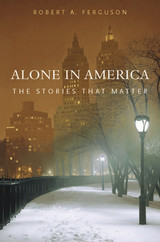
Robert A. Ferguson investigates the nature of loneliness in American fiction, from its mythological beginnings in Rip Van Winkle to the postmodern terrors of 9/11. At issue is the dark side of a trumpeted American individualism. The theme is a vital one because a greater percentage of people live alone today than at any other time in U.S. history.
The many isolated characters in American fiction, Ferguson says, appeal to us through inward claims of identity when pitted against the social priorities of a consensual culture. They indicate how we might talk to ourselves when the same pressures come our way. In fiction, more visibly than in life, defining moments turn on the clarity of an inner conversation.
Alone in America tests the inner conversations that work and sometimes fail. It examines the typical elements and moments that force us toward a solitary state—failure, betrayal, change, defeat, breakdown, fear, difference, age, and loss—in their ascending power over us. It underlines the evolving answers that famous figures in literature have given in response. Figures like Mark Twain’s Huck Finn and Toni Morrison’s Sethe and Paul D., or Louisa May Alcott’s Jo March and Marilynne Robinson’s John Ames, carve out their own possibilities against ruthless situations that hold them in place. Instead of trusting to often superficial social remedies, or taking thin sustenance from the philosophy of self-reliance, Ferguson says we can learn from our fiction how to live alone.
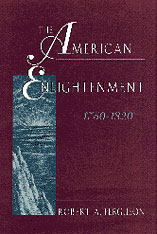
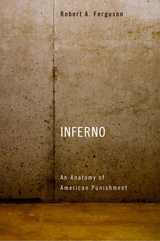
An Open Letters Monthly Best Nonfiction Book of the Year
America’s criminal justice system is broken. The United States punishes at a higher per capita rate than any other country in the world. In the last twenty years, incarceration rates have risen 500 percent. Sentences are harsh, prisons are overcrowded, life inside is dangerous, and rehabilitation programs are ineffective. Looking not only to court records but to works of philosophy, history, and literature for illumination, Robert Ferguson, a distinguished law professor, diagnoses all parts of a now massive, out-of-control punishment regime.
“If I had won the $400 million Powerball lottery last week I swear I would have ordered a copy for every member of Congress, every judge in America, every prosecutor, and every state prison official and lawmaker who controls the life of even one of the millions of inmates who exist today, many in inhumane and deplorable conditions, in our nation’s prisons.”
—Andrew Cohen, The Atlantic
“Inferno is a passionate, wide-ranging effort to understand and challenge…our heavy reliance on imprisonment. It is an important book, especially for those (like me) who are inclined towards avoidance and tragic complacency…[Ferguson’s] book is too balanced and thoughtful to be disregarded.”
—Robert F. Nagel, Weekly Standard
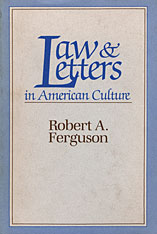
The role of religion in early American literature has been endlessly studied; the role of the law has been virtually ignored. Robert A. Ferguson’s book seeks to correct this imbalance.
With the Revolution, Ferguson demonstrates, the lawyer replaced the clergyman as the dominant intellectual force in the new nation. Lawyers wrote the first important plays, novels, and poems; as gentlemen of letters they controlled many of the journals and literary societies; and their education in the law led to a controlling aesthetic that shaped both the civic and the imaginative literature of the early republic. An awareness of this aesthetic enables us to see works as diverse as Jefferson’s Notes on the State of Virginia and Irving’s burlesque History of New York as unified texts, products of the legal mind of the time.
The Declaration of Independence, the Constitution, and the great political orations were written by lawyers, and so too were the literary works of Trumbull, Tyler, Brackenridge, Charles Brockden Brown, William Cullen Bryant, Richard Henry Dana, Jr., and a dozen other important writers. To recover the original meaning and context of these writings is to gain new understanding of a whole era of American culture.
The nexus of law and letters persisted for more than a half-century. Ferguson explores a range of factors that contributed to its gradual dissolution: the yielding of neoclassicism to romanticism; the changing role of the writer; the shift in the lawyer’s stance from generalist to specialist and from ideological spokesman to tactician of compromise; the onslaught of Jacksonian democracy and the problems of a country torn by sectional strife. At the same time, he demonstrates continuities with the American Renaissance. And in Abraham Lincoln he sees a memorable late flowering of the earlier tradition.
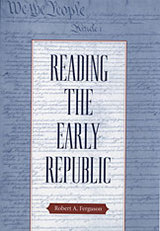
Reading the Early Republic focuses attention on the forgotten dynamism of thought in the founding era. In every case, the documents, novels, pamphlets, sermons, journals, and slave narratives of the early American nation are richer and more intricate than modern readers have perceived.
Rebellion, slavery, and treason--the mingled stories of the Revolution--still haunt national thought. Robert Ferguson shows that the legacy that made the country remains the idea of what it is still trying to become. He cuts through the pervading nostalgia about national beginnings to recapture the manic-depressive tones of its first expression. He also has much to say about the reconfiguration of charity in American life, the vital role of the classical ideal in projecting an unthinkable continental republic, the first manipulations of the independent American woman, and the troubled integration of civic and commercial understandings in the original claims of prosperity as national virtue.
Reading the Early Republic uses the living textual tradition against history to prove its case. The first formative writings are more than sacred artifacts. They remain the touchstones of the durable promise and the problems in republican thought

Over the course of his career at Harvard, Morton Horwitz changed the questions legal historians ask. The Transformation of American Law, 1780–1860 (1977) disclosed the many ways that judge-made law favored commercial and property interests and remade law to promote economic growth. The Transformation of American Law, 1870–1960 (1992) continued that project, with a focus on ideas that reshaped law as we struggled for objective and neutral legal responses to our country’s crises. In more recent years he has written extensively on the legal realists and the Warren Court.
Following an earlier festschrift volume by his former students, this volume includes essays by Horwitz’s colleagues at Harvard and those from across the academy, as well as his students. These essays assess specific themes in Horwitz’s work, from the antebellum era to the Warren Court, from jurisprudence to the influence of economics on judicial doctrine. The essays are, like Horwitz, provocative and original as they continue his transformation of American legal history.
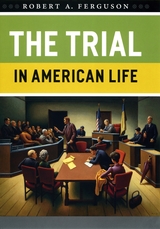
READERS
Browse our collection.
PUBLISHERS
See BiblioVault's publisher services.
STUDENT SERVICES
Files for college accessibility offices.
UChicago Accessibility Resources
home | accessibility | search | about | contact us
BiblioVault ® 2001 - 2024
The University of Chicago Press









